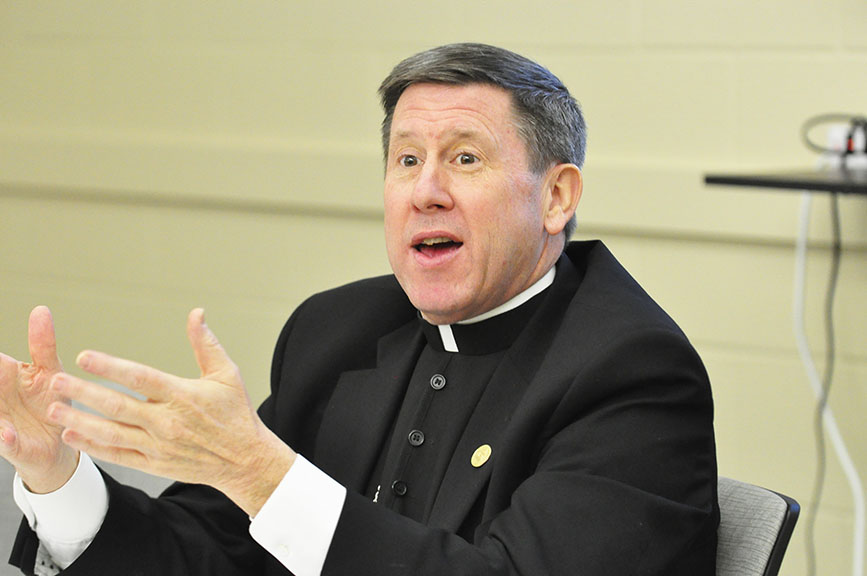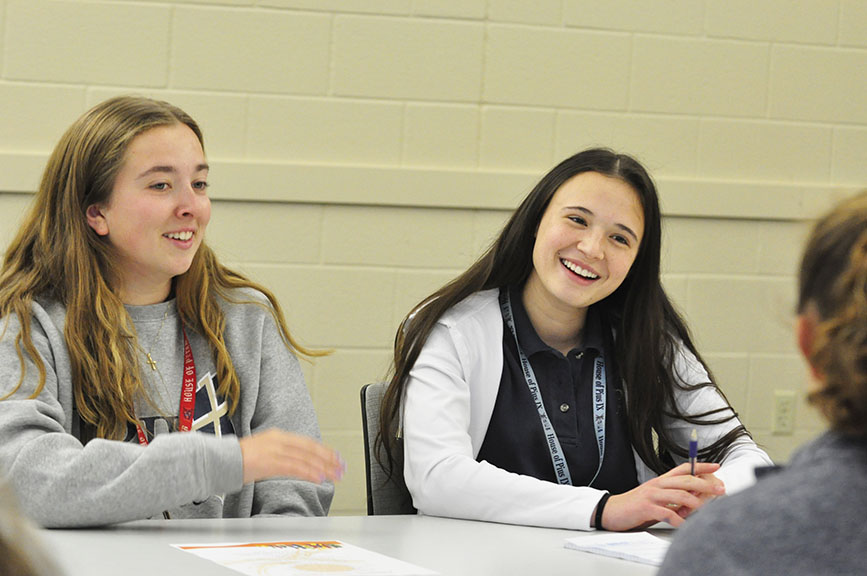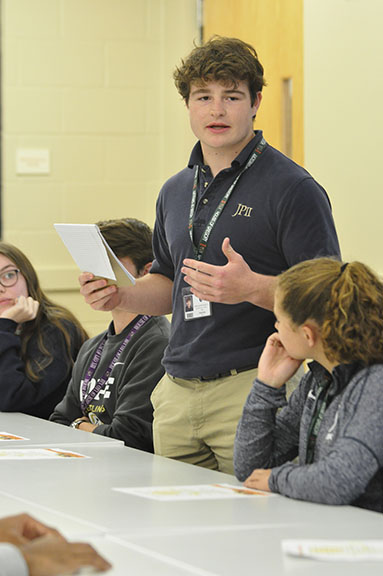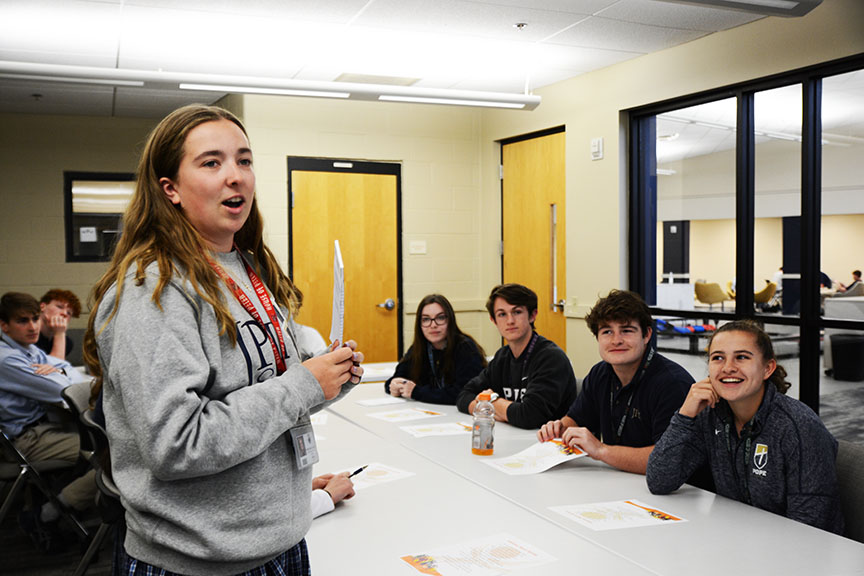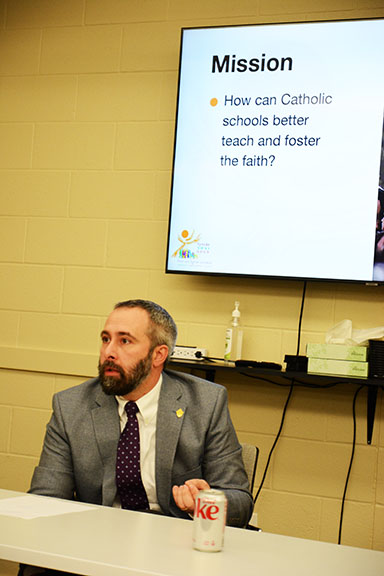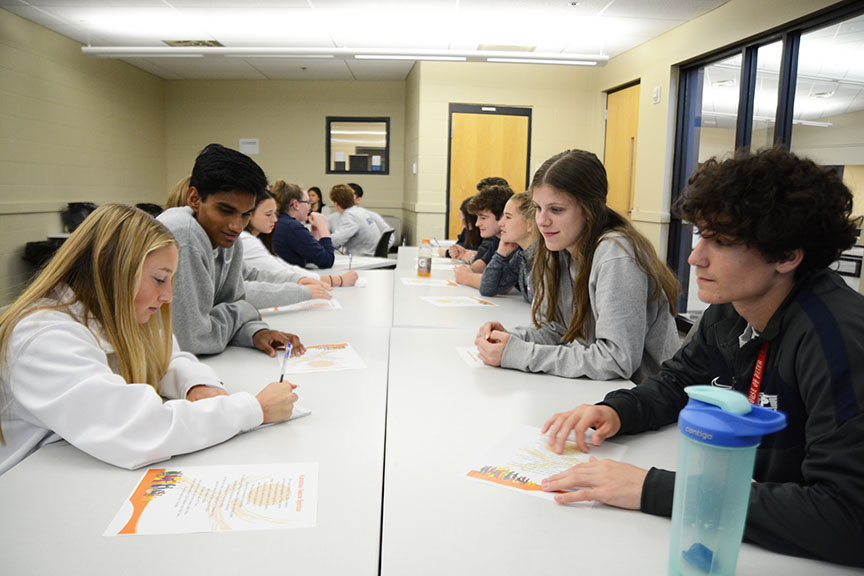
The Synod on Synodality came to Pope John Paul II Preparatory School on Thursday, March 24, when 16 students gathered to talk about the Church and young people’s role in it.
The students participated in a listening session, like the many being held at churches, schools and other locations throughout the Diocese of Nashville as part of a two-year process leading up to the Synod of Bishops on Synodality to be held at the Vatican in October 2023.
“It was definitely different than what I thought,” Pope Prep junior Lillian Pinkston, a parishioner at St. Joseph Church in Madison, said of the listening session. “I thought it was going to be a lecture.”
“It was interesting to hear views from (students from) other parishes,” Pinkston said of the students’ discussion of the three themes of the synod: communion, mission and participation. “People had good points I hadn’t thought of before.”
“I thought it went well. I liked it,” said Pope Prep senior Chris Joseph, a parishioner at St. John Vianney Church in Gallatin. “I didn’t feel like I was getting judged.”
“I’m appreciative of the time Bishop (J. Mark) Spalding spent to come and listen to our thoughts,” Joseph added.
Pope Francis has called on every diocese in the world to participate in the synod, “in which the entire People of God engage in mutual dialogue and authentic listening to foster the Church’s communion, participation and mission,” according to Vatican documents on the synod.
Synodality is defined as “a way of being by which the Church lives out her mission in dialogue with the living voice of the People of God and in openness to the guidance of the Holy Spirit.”
There are three phases of the synod. The first is to begin a discussion at the diocesan level through a series of listening sessions that should include people inside the Church as well as those outside. “Creative means should also be found in order to involve children and youth,” according to the Vatican documents.
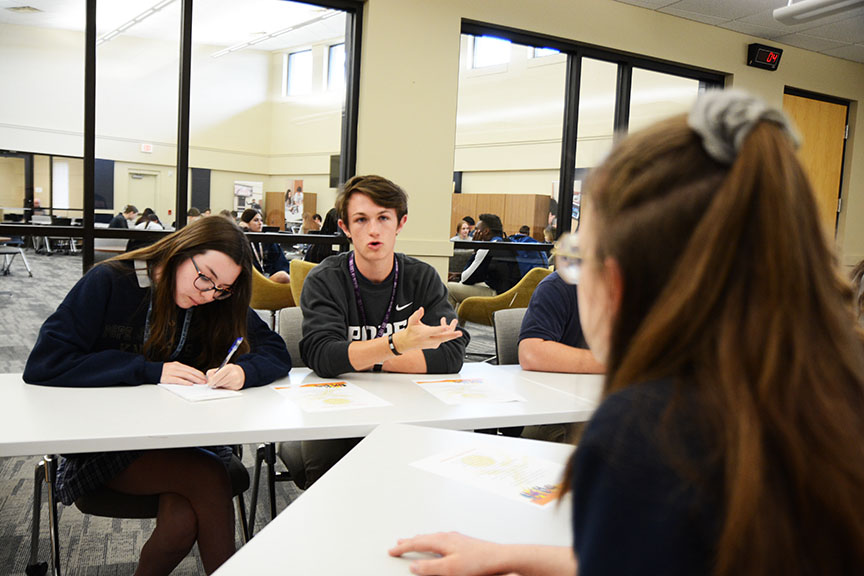
“High school students are unique because they offer two perspectives, one as a student in a Catholic school and another as an active parishioner,” said Dr. Brad Peper, director of the diocesan Office of Faith Formation. He is one of the two diocesan co-contacts overseeing the synod process along with Erin Stracener, director of the diocesan Tribunal.
“I think kids are honest. They want to be heard. They like to be asked things,” said Emily Clavin, director of admissions and a former theology teacher at Pope Prep. “They can offer great, honest feedback. I like that we’re getting to hear their perspective.”
Clavin was involved with other Pope Prep teachers and administrators in selecting the 16 students who participated in the listening session. They were looking for students committed to the school and their church and who have leadership roles in the school, she said.
Bishop Spalding opened the session with a prayer and an explanation of the synod process.
“There might be things in the Church bishops aren’t seeing, but you might see,” Bishop Spalding told the students.
Among the issues the students brought up were the need for more activities for youth in their parishes and maintaining a strong Catholic identity in Catholic schools.
“There were a lot of very valuable insights that we were able to get out of the listening session,” said Peper, the former chair of the theology department at Pope Prep. Among the helpful insights of the students were the need to better integrate theology in all academic disciplines in Catholic schools, and an interest in improving their religious experience, he said.
Listening sessions are also being planned with students from Father Ryan High School and St. Cecilia Academy, Peper said.
The listening sessions throughout the diocese should be complete by the end of April, Peper said. Stracener and Peper will then begin the process of reviewing the reports from the individual listening sessions to compile a 10-page synthesis. That document will be forwarded to the U.S. Conference of Catholic Bishops, where staff will compile the syntheses from all the dioceses in the country into a single document that will be used by Vatican officials as they prepare for the synod in October 2023.
The synthesis that will be prepared at the diocesan level will also be posted on the synod’s webpage on the diocese’s website: www.dioceseofnashville.com.
People who can’t attend a listening session can still participate by filling out a questionnaire available on the synod’s webpage. Among the issues people can discuss and comment on are:
- How can the Church live out its Christian faith?
- How can the local Catholic community foster a Spirit-filled sense of belonging among the laity, new members and visitors?
- How can the local Church encourage participation in the life of the Church by the laity, by young adults, and by youth?
- How can local Catholic communities equip parents with the knowledge and tools to pass on the faith?
- How is the local Church reaching people on the margins of society?
- How does the local Catholic community foster the faith with active Catholics and engage with fallen away Catholics, people of other denominations or religions, and those with no religious affiliation.
Diocesan and parish leaders will not have to wait until the synod process is complete to start considering how they can meet the needs revealed through the listening sessions, Peper said. That process can begin during the first phase, he said.
For more information about the synod, visit www.dioceseofnashville.com/synod.
